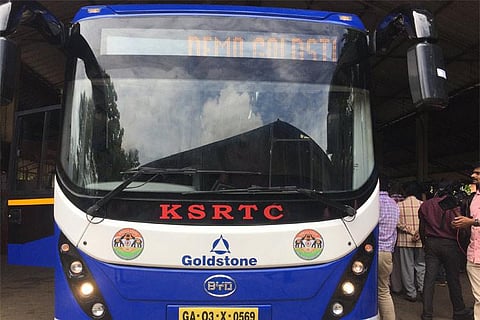

After five years of delay, the Bengaluru Metropolitan Transport Corporation (BMTC) has finally floated a tender to induct 300 electric buses. The BMTC has been promising to induct electric buses into its fleet since 2014 but no concrete action had been taken in the past to make this a reality. The BMTC had conducted a pilot project in 2014.
BMTC also recently lost Rs 75 crore of central government subsidy for its indecisiveness. According to BMTC officials, the e-buses are likely to hit the roads sometime around the beginning of 2020.
Another 100 buses, which will be leased as part of the same tender contract, will be given to Karnataka State Road Transport Corporation (KSRTC) and North Western Karnataka Road Transport Corporation (NWKRTC). Both will receive 50 e-buses each.
Officials in the know said that since the buses are being leased, it will be charged on a per-kilometre basis, although the bus fare will remain constant.
“We have floated the tender and are looking at a rate of around Rs 40/km, which is almost half of the cost at which we run our Volvo AC buses,” an official said.
These 300 airconditioned buses are set to be deployed in both airport and non-airport routes. This procurement will be done as part of ‘Faster Adoption and Manufacturing of (Hybrid and) Electric vehicles (FAME)’-II subsidy scheme by the Union Ministry of Heavy Industries and Public Enterprises. The subsidy covers Rs 1 crore for every AC bus and Rs 73 lakh for non-AC buses.
The BMTC had earlier missed the Rs 75 crore subsidy as it failed to utilise the first phase of FAME scheme, which expired on March 31. This was due to an apparent disagreement with former Transport Minister DC Thamanna and former Managing Director (MD) of BMTC.
While the BMTC MD had initially mooted the idea of leasing electric buses owing to the low financial burden, then Transport Minister DC Thamanna pushed for purchasing the buses, which led to a conflict within the organisation in November 2018.
This also meant that the fleet of the BMTC has not increased over the years after the National Green Tribunal has banned the purchase of buses with Bharat Stage (BS) IV emission standard (norms to regulate output of air pollutants from vehicles) and asked BMTC to buy only electric or CNG buses. Even the Karnataka State Pollution Control Board has asked the BMTC to phase out its existing BS-III buses.
Compared to CNG buses, the maintenance cost of electric buses is lower, thus ensuring better revenue compared to the current diesel buses. An Indian Institute of Science (IISc) study has also found that replacing a diesel bus with an electric bus reduces up to 25 tonnes of carbon dioxide (CO2) emission annually.
While the introduction of electric buses was well-received by the public, there is also an opinion that priority should be given to non-AC buses for cheaper intra-city transport when bus fares in Bengaluru are already the highest in the country.
Sandeep Anirudhan, the founder of Citizens Agenda Forum, said, “There are talks that all normal BMTC buses are going to be retrofitted with electric motors. That will make all buses noise-free and efficient.”
He also questions the need to make these buses airconditioned. “Think about how much money can be saved by investing in normal buses instead of AC buses, and how many more buses can be purchased and enhance public transport. Besides, AC buses further emit heat into the surroundings and destroying our city's ambience,” he says.